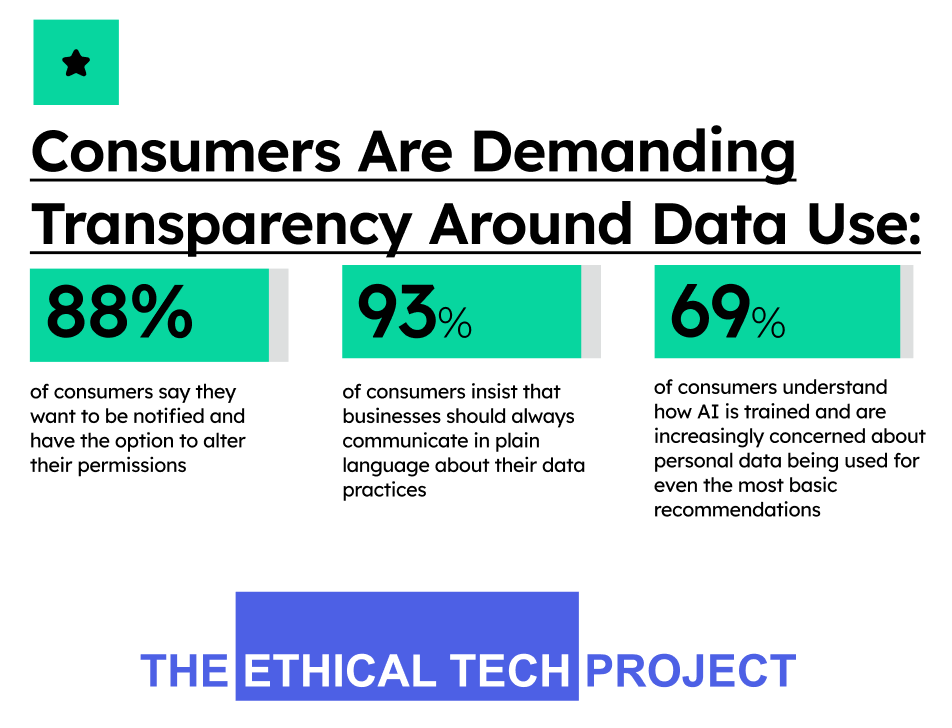Transparency in the AI Era: A Demand, Not a Choice
In a world where AI is increasingly shaping our digital experiences, how much do consumers really know about what happens with their data?
Results from our new national poll show a striking demand for transparency in how data is used in AI technologies. For companies using AI, embracing transparency isn't just ethical; it could be your competitive edge.
Welcome back and hello to all of our new readers! This is Part 3 of our deep dive into how Americans feel about our 5 core principles as they relate to data in the Age of AI. After focusing on agency two weeks ago, this week we’re looking at transparency.
Transparency: Businesses must communicate – in simple language – how they will use data they collect, who they will share that data with, and how long they plan on storing the data.
Sounds straightforward, right? Well, our polling suggests that’s not always the case.
Understanding AI's Data Appetite:
A whopping 86% of respondents believe that their data is likely being used for AI purposes, even when not explicitly stated. This understanding, however, doesn't equal acceptance. While many are aware of this potential usage, there's a noticeable lack of comfort and trust surrounding it. The key concern lies in the vague nature of data utilization practices, leaving users unsure about where and how their information is being applied. It's not about companies knowing every future application of data; in fact, even if they do not have a clear sense of what purpose they have for user data, companies can still provide a clear picture of their intentions. Users need to understand the 'why' behind their data collection to meaningfully consent to a company's terms.
Training AI? Keep It Transparent:
57% of respondents understand how AI is trained, and there's a growing concern (+12%) about personal data being used for even the most basic recommendations. People care about their data, regardless of the use case. As AI technology becomes more integrated into daily life, the public's understanding of its mechanisms has also grown, a sign that the era of blindly trusting tech companies with personal data is long gone. Whether it's for tailoring a news feed or suggesting a new song, people want to know when and how their personal data is being used. Users are seeking assurances that their data is not only used responsibly but also with their explicit consent.
Clarity Is King:
A massive 93%—sn: when's the last time you heard 93% of Americans agreed on anything?—insist that businesses should always communicate in plain language about their data practices. This includes details on data usage, sharing, and retention policy. As people grow increasingly aware of their digital footprint, there's a unanimous call for simplicity. Understanding a company's data policy shouldn't require a law degree. Folks want the facts about their data laid out in a way that's easy to grasp – no legal mumbo jumbo, just clear, straight forward information.
Changing Terms? Let us Know:
If the terms of data use change, 88% of respondents said they want to be notified and have the option to alter their permissions. As we saw with the Zoom controversy that resulted in them walking back the updates to their privacy terms, people are voicing a clear demand: keep us in the know. No one likes surprises, and that includes what happens with your personal data. This is a call for businesses to step up their game in communication – not just at the start, but continuously. As data practices evolve, so should the conversation with users. And as these changes happen, they shouldn't just be announced, but also accompanied by easy-to-use options for users to adjust their settings accordingly.
The Big Takeaway: People Demand Clear Communication About Data Usage
There’s a clear message here: consumers are not just passive data sources. They’re actively interested in how their digital breadcrumbs are used and want to be part of the conversation.
Tell us your thoughts! How do you feel about transparency in AI? Are you comfortable with how your data is used, or do you feel left in the dark? Share your thoughts; we’re all ears!
What We’re Reading On Ethical (and Non-Ethical) Tech This Week:
Microsoft temporarily blocked staff from using ChatGPT over security concerns, report says - Business Insider
With AI, The Most Profound Career Shift In A Generation Is Upon Us - Forbes
Google Sues to Block AI Ads Preying on Small Businesses - WSJ
AI Ethics: Steering Humanity Away from a Technological Dystopia - Medium
The US of AI for Good - InformationWeek






